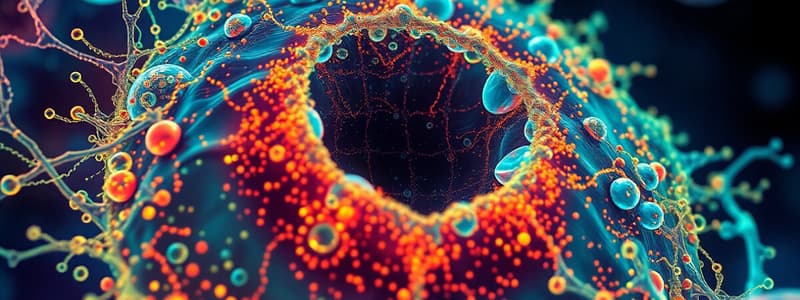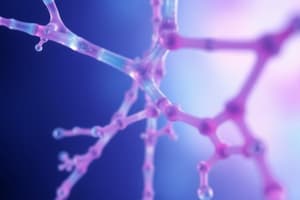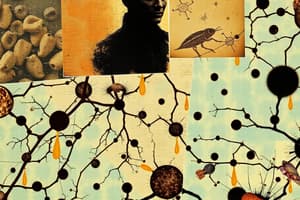Podcast
Questions and Answers
Which component is not part of an animal cell?
Which component is not part of an animal cell?
- Mitochondria
- Cell wall (correct)
- Cytosol
- Nucleus
What process occurs in the mitochondria of a cell?
What process occurs in the mitochondria of a cell?
- Excretion
- Cell division
- Photosynthesis
- Cellular respiration (correct)
What term is used for the organism that becomes infected by a disease?
What term is used for the organism that becomes infected by a disease?
- Pathogen
- Organism
- Cell
- Host (correct)
Why is it important for a specimen to be thin when viewed under a light microscope?
Why is it important for a specimen to be thin when viewed under a light microscope?
What are the two main types of microscopes used in biology?
What are the two main types of microscopes used in biology?
What is the primary function of ribosomes within a cell?
What is the primary function of ribosomes within a cell?
In multicellular organisms, why are cells preferred over a single large cell?
In multicellular organisms, why are cells preferred over a single large cell?
Which structure is found in plant cells but not in animal cells?
Which structure is found in plant cells but not in animal cells?
Why did James observe many chloroplasts in each cell while Emily could not identify any?
Why did James observe many chloroplasts in each cell while Emily could not identify any?
Is it possible for a plant cell to survive without a nucleus?
Is it possible for a plant cell to survive without a nucleus?
What type of microscope is most likely used to create detailed images of cell structures?
What type of microscope is most likely used to create detailed images of cell structures?
Why should doctors avoid prescribing antibiotics for viral infections?
Why should doctors avoid prescribing antibiotics for viral infections?
What is an ethical advantage of using stem cells for drug testing over traditional methods?
What is an ethical advantage of using stem cells for drug testing over traditional methods?
What was Howard Florey's perspective on the patenting of penicillin?
What was Howard Florey's perspective on the patenting of penicillin?
In the context of similes, what is their primary function in creative writing?
In the context of similes, what is their primary function in creative writing?
What role does a nucleus play in a plant cell's survival?
What role does a nucleus play in a plant cell's survival?
Flashcards
Animal cell component not found in plant cells
Animal cell component not found in plant cells
Animal cells lack a cell wall, a rigid structure found surrounding plant cells.
Mitochondria function
Mitochondria function
Cellular respiration, the process of releasing energy from food, occurs within the mitochondria.
Cell theory
Cell theory
All living things are made of cells, cells are the basic unit of life, and new cells arise from existing cells.
Unicellular vs. multicellular organisms
Unicellular vs. multicellular organisms
Signup and view all the flashcards
Light microscope thin specimen
Light microscope thin specimen
Signup and view all the flashcards
Chloroplast vs. Mitochondrion
Chloroplast vs. Mitochondrion
Signup and view all the flashcards
Microscope magnification calculation
Microscope magnification calculation
Signup and view all the flashcards
Pathogen
Pathogen
Signup and view all the flashcards
Why chloroplasts appear absent?
Why chloroplasts appear absent?
Signup and view all the flashcards
Nucleus function
Nucleus function
Signup and view all the flashcards
Can a cell survive without a nucleus?
Can a cell survive without a nucleus?
Signup and view all the flashcards
Virus perspective
Virus perspective
Signup and view all the flashcards
Microscope impact on cell understanding
Microscope impact on cell understanding
Signup and view all the flashcards
Antibiotic effectiveness
Antibiotic effectiveness
Signup and view all the flashcards
Ethical stem cell research
Ethical stem cell research
Signup and view all the flashcards
Patenting penicillin
Patenting penicillin
Signup and view all the flashcards
Study Notes
Multiple Choice Questions
- Animal cells do not have cell walls.
- Cellular respiration occurs in mitochondria.
- The organism infected with a disease is called a host.
Short Answer Questions
- The first person to describe a cell was Robert Hooke.
- Stains enhance specimen visibility under a microscope.
- The cell theory states cells are the fundamental units of life, all living things are composed of cells, and all cells come from pre-existing cells.
- Two types of microscopes are light microscopes and electron microscopes.
- Specimens need to be thin for light microscopes to view them because light can only pass through a thin enough specimen.
- Mitochondria are responsible for energy production in cells. Chloroplasts are involved in photosynthesis, and a key difference from mitochondria is that chloroplasts contain chlorophyll.
- Fungal cells have chitin in their cell walls and bacteria have peptidoglycan while fungal cells have chitin in their cell walls and bacteria have peptidoglycan in their cell walls.
- Nucleus: the control center of a cell; Mitochondrion: the power house that produces energy; Chloroplast: organelle for photosynthesis; Binary fission: a type of asexual reproduction; Pathogen: a disease-causing agent.
- Ribosomes synthesize proteins in cells.
- Unicellular organisms are made up of one cell, examples include bacteria and amoebae while multicellular organisms are made up of multiple cells, examples include animals and plants.
Apply and Analyze Questions
- Antibiotics cannot treat viral infections like Covid-19 because they target bacterial cells, not viral cells.
- Substances entering a cell might include nutrients and some exiting might include waste products.
- Unicellular organisms are small because their internal surface area is maximized. Multicellular organisms have different structures for efficient exchange of materials.
- Doctors do not prescribe antibiotics for colds or flu as these are usually viral infections.
- Animal cells have mitochondria for energy production. Plant cells also have chloroplasts for photosynthesis in addition to mitochondria.
- Light microscopes require thin cells or sections for light to pass through, enabling visualization.
- Magnification is calculated by multiplying the objective lens and eyepiece lens powers. For instance a cell viewed with a "x40" objective lens and a "x10” eyepiece lens results in x400 magnification.
Evaluate Questions
- James' observation of many chloroplasts was due to the specimen being from the leafy part of an onion, where chloroplasts reside.
- Plant cells require nuclei for vital functions and survival; therefore no plant cells can survive without them.
- A short story about a virus from the perspective of a cell is not provided.
- The microscope most likely for viewing images in "Figure 1" needs to be identified.
Social and Ethical Thinking Questions
- Antibiotics are effective against bacteria, but overuse promotes antibiotic resistance, hindering their effectiveness.
- Stem cell testing is often more ethical than animal or human testing because it minimizes harm to living creatures.
- Arguments for and against patenting penicillin (from various viewpoints) are not detailed.
Critical and Creative Thinking Questions
- Similes compare objects based on common characteristics.
- Cells are comparable to building blocks, nuclei to control centers, and mitochondria to power stations.
- Microscope advancements have greatly improved our understanding of cell functions and structures.
Research Questions
- A single research topic with associated questions is not described at this stage.
Studying That Suits You
Use AI to generate personalized quizzes and flashcards to suit your learning preferences.




